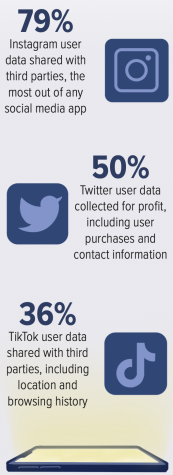The terms and conditions of Silicon Valley’s largest tech giants
November 12, 2022

Living in the heart of Silicon Valley, we frequently imbibe the doctrine of tech optimism, glorious visions of a digitalized future brought about by technology. Yet the contrary is just as apt — unprecedented advancements have led to tech giants monopolizing the field, influencing our lives in subtle ways. Most of the content we consume is digital. But the connectivity we reap from this online ecosystem comes with a steep price: our data. Consenting without reading privacy notices, we sacrifice our data to corporations, unconditionally granting the rights to sell and distribute them. As these data reveal all aspects of our lives, many groups, including the American Civil Liberties Union, believe it is time to consider the impact of technology on society and whether we should accept the terms prescribed by online platforms.
For upper school computer science teacher Anu Datar, the greatest problem with current tech policy lies in the ambiguity surrounding how our data can be used. With no clear-cut regulation on privacy, companies are mostly free to use consumers’ data as they desire.
“There’s a lot of gray areas, there’s a lot of misuse of personal information,” Datar said. “Many times users click on ‘accept Terms and Conditions’ without really reading through them. That allows many of the app developers or even some third party software builders to misuse their personal information in ways that are actually pretty dangerous. That’s the biggest thing, people not realizing how the information that they’re putting out there can be used.”
Yet, we unconsciously give information about ourselves to tech companies all the time. To many, casually scrolling through Instagram feeds or watching TikTok videos offers a comforting respite from the stress of everyday life. But even in these little moments, unseen algorithms run behind the scenes, busying themselves with tracking our data and preferences. At surface level, this consumer surveillance may seem innocuous: companies work for profit, and exchanging some privacy for the convenience and entertainment of social media is a trade many would make. However, as companies sell and disseminate our data, such a compromise only reveals the scope of the privacy we lose when we understand how unrelated third parties will use it.
“Sometimes the information usage is acceptable; they show me targeted ads and I’m sort of okay with that because it doesn’t really hurt or harm me,” Datar said. “But then there are other things — it’s tracking my location, it’s also aware of when I am away from home, my patterns. If my data or my information about everything, like my spending habits [or] my eating, [is being tracked], then I’m vulnerable to being attacked in a bunch of different ways.”